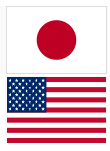American Consumer Goods and Services in Japan
With an estimated population of 127.4 million and the second largest economy in the world with a nominal gross domestic product of U.S. $4.5 trillion, Japan has one of the largest consumer markets in the world. Aside from statistics, it is the mindset of the Japanese that further drives spending power. The Japanese are known for their fine tastes in clothing, cars, and electronics, all of which converge to create an individual’s image and reputation – concepts that the Japanese are intently concerned about. While domestic brands like Zara, Lexus, and Sony are widely respected and supported by their own people, the Japanese also take a strong liking in foreign products that would further their image and/or be of value to the buyer. The rise in global marketing strategies is also a major contributor for the popularity and consumption of international products as more and more companies compete in attempting to win the global consumer’s dollar.
Several American-based corporations have demonstrated superior success in marketing their product to foreign communities, specifically that of Japan. Not only does one see these establishments when taking a walk through the heart of Tokyo’s Shinjuku district, but their presence exists widely throughout all of developed Japan. Such food establishments as Starbucks, McDonalds, and Yum Food Brands (owner of Kentucky Fried Chicken) strongly link the gateway to the Orient with the westernized world.
Starbucks did not introduce the coffee-shop culture in Japan; rather it was already in existence by the largest domestic coffee chain, Doutor Coffee. In the past decade, Starbucks did bring a more pleasurable experience to the smoky coffee shops of Japan and along with it, an appealing product, backed by international name brand recognition. To date, Starbucks has over 700 of its 13,000 stores located across Japan. Walking through downtown Tokyo, one can be assured that a Starbucks location is no further than a 10 minute walk. Stores have even been placed 200 feet apart.
As the world’s largest chain of fast-food restaurants, McDonald’s roots have been firmly implanted in Japan for decades. Although menu choices are slightly catered to the Asian market, McDonald’s serves what the Japanese consider to be “American food” and it sells. McDonald’s Holding Company Japan announced that ordinary income increased about 2.4 times from March 2006, a year earlier, due to a remarkable year-to-year rise in restaurant’s sales of 9.6%. It is also interesting to note that a recent study suggests that McDonald's led to the easing or elimination of various cultural taboos, such as eating while walking in Japan.
Disney amusement parks, the Disney logo, and its characters are synonymous with Japanese childhood and family vacations. The Walt Disney Company, based in Florida, does not, however, own or operate Tokyo Disneyland, Disneysea, or Disney Stores in Japan. Instead, the Oriental Land Company, a Japanese leisure and tourism corporation, originally spearheaded the launch of the first international Disney park in the early 1980’s and pays the Walt Disney Company for character and other licenses. Nevertheless, the Japanese share a common, almost obsessive love with the originally American Disney concept. Thousands of visitors flock yearly to the resort outside of Tokyo. They then aspire to vacation at the larger resort in Orlando which drives tourism in the United States and puts additional dollars into the overflowing bank of the Mouse House.
Intel and Microsoft have firmly out competed domestic brands such NEC electronics and Elpida Memory in the technology world. And interestingly, Coca-Cola took notice of the Japanese tea and coffee culture to put to market Georgia, a coffee flavored beverage, which ranks higher in sales in Japan than the drink from which the company gets its name. Introduced skeptically in 1975 to only the Japanese market, Georgia has become the highest-grossing coffee beverage in the country. Now ubiquitous with “can coffee,” Japan’s craving of quick caffeine can be satiated at the abundantly located vending machines, found littered in every inch of public space.
From a sampling of popular American products widely sold and distributed in Japan, one can conclude that American businesses have capitalized on foreign markets as they seek to increase profits and maximize growth. Consequently, it is not surprising to find that U.S. imports into Japan account for 12.7 percent of all Japanese imports, second behind China.
From the Japanese perspective, American products have differentiated themselves from those found domestically. The Japanese find such products and the culture associated with them unique, beneficial, and at times, statement-making. These facts spur the popularity of American products that continue to infiltrate the market as more and more Japanese jump on the American bandwagon.
